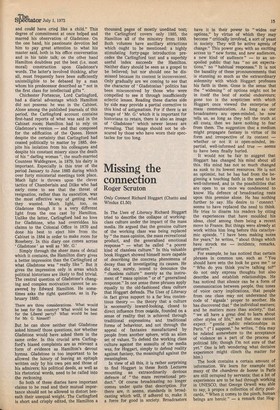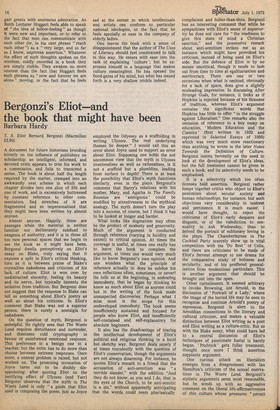Missing the connection
Roger Scruton
Only Connect Richard Hoggart (Chatto and Windus £1.50) In The Uses of Literacy Richard Hoggart tried to describe the collapse of workingclass culture under the impact of the mass media. He argued that the genuine culture of the working class was being replaced by "the mass opinion, the mass recreational product, and the generalised emotional response" — what he called "a poorer kind of classless culture." In this valuable book Hoggart showed himself more capable of describing the concrete phenomena of decay than of investigating its causes. He did not, surely, intend to denounce the "classless culture" merely as the instrument of "mass opinion" or of "generalised response." In one sense these phrases apply equally to the old-fashioned class culture that Hoggart defends. The Uses of Literacy in fact gives support to a far less contentious theory — the theory that a culture is necessarily inward-looking, closed to direct influence from outside, founded on a sense of reality that is achieved through traditional expressions and traditional forms of behaviour, and not through the appeal of fantasies manufactured by people from another sphere, with an alien set of values. To defend the working class culture against the assaults of the media was, for Hoggart, simply to defend reality against fantasy, the meaningful against the meaningless.
In view of all this, it is rather surprising to find Hoggart in these Reith Lectures mounting an extraordinarily devious defence of "the mass recreational product." Of course broadcasting no longer comes under quite that description. For there are, it seems, standards in broadcasting which will, if adhered to, make it a force for good in society. Broadcasters have it in their power to "widen our options," by virtue of which they may become "critically involved, a sort of yeast in society. They will be active agents of change." This power goes with an exciting access to "new forms, and new audiences, a new kind of audience" — to an unspoiled public that has "no set expecta tions," no "habitual responses." It is not the banality of these pronouncements that is stunning so much as the extraordinary solemnity with which Hoggart professes his faith in them. Gone is the sense that the " widening " of options might not be in itself the best of social endeavours; gone too is the scepticism with which Hoggart once viewed the enterprise of mass communication. As long as our broadcasters are open-minded, he now tells us, as long as they tell the truth at all costs, then we have nothing to fear from them. The suggestion that a medium might propagate fantasy in virtue of its form and irrespective of its content — whether or not it is open-minded, impartial, well-informed and true — seems to have been finally buried.
It would not be fair to suggest that Hoggart has changed his mind about all this. His mind has not so much changed as sunk to its lowest resources. He is not an optimist, but he has had from the beginning a touching faith in the need to be well-informed, and in the possibilities that are open to us once we condescend to know. His defence of broadcasting rests upon this premise alone. He has nothing further to say. His desire to ' connect' seems to have replaced the need to think. He tries to disarm his readers by citing the experiences that have moulded his ideas, chief among them being a recent move to France. But things were already at work within him long before this cataclysmic episode. "I have been making notes for years," he writes, "about things which have struck me — incidents, remarks, gestures."
For example, he has noticed that certain phrases in common use, such as "You should have setn the look he gave me" or "Who do you think you're talking to?" do not only express thoughts but also describe and establish relationships. He has noticed that silence can be a form of communication between people, that tones of voice carry implications, that people from one class may not understand the code of 'signals' proper to another. He has discovered that " the individual matters; and he matters more than society," that "we all have a great deal to learn about other styles of life," and that one cannot expect "gentle public relationships in Paris." (" I suppose," he writes, " this may be related somewhere to the acceptance of violence as a part of the process of political life; though I'm not sure of that yet." One is left wondering what decisive experience might clinch the matter for him.) The book contains a certain amount of information. We learn for example that many of the chambres de bonne in Paris are still occupied by servants; that a lot of experiences are to be had through working in UNESCO, that George Orwell was able to say, a propos a collection of dirty postcards, "When it comes to the pinch, human beings are heroic" — a remark that Hog gart greets with enormous admiration, As Reith Lecturer Hoggart feels afble to speak of "the idea of fellow-feeling" as though It were new and important, or to refer to the fact that men can communicate with each other (or, in his cant phrase "reach each other ") as .a "very large, and so far as I know, unproven assertion." Whatever the effect of such thoughts spoken on the wireless, coldly recorded in a book they are simply risible. They awaken no more interest than the fact that Hoggart finds such phrases as "now and forever we are alone" moving, or the fact that he feels sad at the extent to which intellectuals and artists can conform to particular national ideologies, or the fact that he feels specially at ease in the company of elderly ladies.
One leaves the book with a sense of disappointment that the author of The Uses of Literacy should feel constrained to talk in this way. He enters with ease into the task of explaining ' culture '; but he expresses himself in a language that makes culture meaningless. He has opened the flood-gates of his mind, but what has issued forth is a very shallow trickle indeed.























































 Previous page
Previous page